|
|
|
Sort Order |
|
|
|
Items / Page
|
|
|
|
|
|
|
| Srl | Item |
| 1 |
ID:
145565
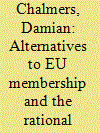

|
|
|
|
|
| Summary/Abstract |
The domestic scenario following a Brexit vote is likely to be characterised by high stakes, uncertainty and fissile political debate. No off-the-peg arrangement touted for Brexit—be it Norwegian, Swiss, Turkish or Canadian—was designed to engage with such a context. Nor does it seem wise to rush to medium-term commitments which might pre-empt democratic politics and wise choices. Far more important will be the legitimacy of any institutional settlement governing this arrangement, which will provide the context for its revision and development and the space for democratic reflection over how these policies are to be governed. It will be suggested that here there is much insight to be gained from looking at regional arrangements beyond the EU.
|
|
|
|
|
|
|
|
|
|
|
|
|
|
|
|
| 2 |
ID:
145552


|
|
|
|
|
| Summary/Abstract |
Employment and labour market regulation initially appeared as one of the solid red lines in the UK's renegotiation of the country's place in the EU. The basic argument is that the UK's more deregulated labour market would sit uneasily in the more organised models, based on statutory instruments or collective bargaining, found on the continent. While there is a legitimate problem here, EU employment regulations appear manageable from the point of view of business, while unions see them as important tools for socially responsible economic restructuring. Most of UK employment case law is now deeply entangled with EU law; labour market regulations have, on the whole, become part of the way of doing business in the Single Market; and a simple cost–benefit analysis appears impossible because some costs are not quantifiable and the costs of others are reduced when taken as a bundle. Labour unions agree that transposition of European law needs to be done taking into account local sensitivities, while internationally oriented companies do not see EU regulations on the whole as detrimental to business. Importantly, though, the costs and benefits of EU employment regulations are not symmetrically distributed across different companies: large companies are better able to reap the rewards and accommodate the costs of operating in the Single Market than smaller companies.
|
|
|
|
|
|
|
|
|
|
|
|
|
|
|
|
| 3 |
ID:
145551


|
|
|
|
|
| Summary/Abstract |
The way in which free movement of people has become the central issue of the British government's renegotiation and referendum campaign on the UK's relationship with the European Union (EU) risks obfuscating at least three central issues: why immigrants are coming to the UK; what impact EU migrants are having on the UK; and what can be done to effectively regulate such inflows. It is, however, not just the eurosceptics and the British government, but also ‘in campaigners’ and other EU member states, who risk perpetuating a number of widely held misconceptions about free movement and immigration for political reasons. Buying into such myths risks undermining attempts to have a more honest and more evidence-based debate about immigration and migrant integration.
|
|
|
|
|
|
|
|
|
|
|
|
|
|
|
|
| 4 |
ID:
145555


|
|
|
|
|
| Summary/Abstract |
Two issues currently dominate the UK's constitutional landscape: the UK's membership of the European Union (EU) on the one hand; and the unsettled constitutional settlements between the UK and the devolved administrations of Scotland, Wales and Northern Ireland on the other. This article considers these two issues in concert. It stresses the distinct relationships between the EU and the devolved territories within the UK—concerning both devolved and non-devolved policy areas—highlighting the salience of a devolved perspective in any consideration of UK–EU relations. Despite its importance, sensitivity to this has been lacking. The article explores the implications of a ‘Leave’ or ‘Remain’ outcome on the future of the internal territorial dynamics within the UK. While there are too many unknowns to be certain of anything, that there will be knock-on effects is, however, beyond doubt.
|
|
|
|
|
|
|
|
|
|
|
|
|
|
|
|
| 5 |
ID:
145560


|
|
|
|
|
| Summary/Abstract |
In this article, we review the EU's significance for social policies in the UK. The EU has a limited legal role or institutional capacity to directly regulate the social policies of its member states. This role is even more limited in the case of non-eurozone countries. There are a handful of EU policy measures which have had effects on social policy in the UK. However, these effects have not changed the institutional arrangements for making, organising and delivering social policy, which remain firmly in the hands of UK governments. In consequence, a ‘Leave’ or ‘Remain’ result has relatively limited implications for social policy, except in the case of specific social groups: notably for UK and other EU nationals who have lived and worked in at least one other EU country. Other EU legislation and regulation is compatible with the current and historical policy preferences of UK governments and political parties.
|
|
|
|
|
|
|
|
|
|
|
|
|
|
|
|
| 6 |
ID:
145557


|
|
|
|
|
| Summary/Abstract |
The UK has influenced some major EU policies, such as the creation of the single market and enlargement. But how influential are the UK government and British MEPs in the day-to-day EU legislative process? To answer this question, this article analyses recent data from the Council of the European Union and the European Parliament. The evidence is mixed. In the Council, in recent years the UK government has been outvoted more often than any other EU government, yet UK officials remain well connected ‘behind the scenes’. In the European Parliament, British MEPs are now more likely to be on the losing side than are the MEPs of any other member state, yet British MEPs still win key committee chairs and rapporteurships. The evidence suggests that if the UK votes to remain in the EU, Britain's political elites will need to re-engage with Brussels politics if the UK is to avoid becoming further marginalised from mainstream EU politics.
|
|
|
|
|
|
|
|
|
|
|
|
|
|
|
|
| 7 |
ID:
145556


|
|
|
|
|
| Summary/Abstract |
In the 1975 referendum England provided the strongest support for European integration, with a much smaller margin for membership in Scotland and Northern Ireland. By 2015 the rank order of ‘national’ attitudes to European integration had reversed. Now, England is the UK's most eurosceptic nation and may vote ‘Leave’, while Scotland seems set to generate a clear margin for ‘Remain’. The UK as a whole is a Brexit marginal. To understand the campaign, we need to make sense of the dynamics of public attitudes in each nation. We take an ‘archaeological’ approach to a limited evidence-base, to trace the development of attitudes to Europe in England since 1975. We find evidence of a link between English nationalism and euroscepticism. Whatever the result in 2016, contrasting outcomes in England and Scotland will exacerbate tensions in the UK's territorial constitution and could lead to the break-up of Britain.
|
|
|
|
|
|
|
|
|
|
|
|
|
|
|
|
| 8 |
ID:
145553
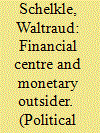

|
|
|
|
|
| Summary/Abstract |
The UK's negotiating position in the area of ‘economic governance’ started from the assumption that there is a deep dividing line between insiders and outsiders of the ‘euro zone’. To protect the outsiders, the UK government did not ask for a veto, but for a safeguard mechanism that can postpone a decision in the euro area. This is exactly what David Cameron achieved in the negotiations with Council President Tusk. This article explains why the UK demands were so modest. Key is the peculiar situation of the UK being the major financial centre for a currency union to which it does not belong. Hence, the UK taxpayer needs protection from the City, and EU membership has helped to provide this. There is not much else a UK government could ask for.
|
|
|
|
|
|
|
|
|
|
|
|
|
|
|
|
| 9 |
ID:
145564
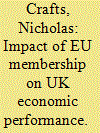

|
|
|
|
|
| Summary/Abstract |
The relatively deep level of economic integration achieved by the European Union (EU) has been highly successful in increasing trade for its members. Larger trade volumes have had positive effects on productivity levels. In the case of the United Kingdom the gain from joining the EU was probably around 10 per cent of GDP and this far exceeded any costs of membership, possibly by a ratio of seven to one. A major reason for this outcome was a significant increase in competition as protectionism was abandoned. The economic implications of Brexit are much less clear because there are many permutations of what it would entail. Future trade barriers rather than budgetary transfers are the main issue. Brexit could be quite costly if the UK left the single market and used its new policy space badly. Ironically, while Brexit clearly appeals to free traders, it could end up empowering protectionists.
|
|
|
|
|
|
|
|
|
|
|
|
|
|
|
|
| 10 |
ID:
145562
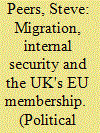

|
|
|
|
|
| Summary/Abstract |
A key part of the debate about the UK's membership of the EU is concern about levels of migration and the impact upon security. This paper assesses how much impact EU membership has on each of these issues, and examines the likely impact of leaving the EU in each of these areas.
|
|
|
|
|
|
|
|
|
|
|
|
|
|
|
|
| 11 |
ID:
145558


|
|
|
|
|
| Summary/Abstract |
Previous research has suggested that attitudes towards the European Union (EU) are shaped by two sets of considerations—economic and cultural. Using data from the 2015 British Social Attitudes survey, this article assesses which matters more in shaping attitudes in Britain towards the EU as the country prepares to vote in a referendum on whether it should remain in or leave the European Union. It shows that while concern about the cultural consequences of EU membership is widespread, voters are inclined to think that membership is economically beneficial. This cultural concern underpins a widespread scepticism about Europe, but voters are only likely to want to leave the EU if they are also convinced of the economic case for doing so.
|
|
|
|
|
|
|
|
|
|
|
|
|
|
|
|
| 12 |
ID:
145554


|
|
|
|
|
| Summary/Abstract |
The research and higher education sectors have an exemplary place in the referendum debate. They were not part of the David Cameron renegotiation package, but stakeholders in favour of Remain have disrupted the consensus that in these sectors the EU's role is relatively unimportant and that the UK's achievements can be explained in national terms. The article seeks to explain, first, the change in political dynamics that has brought the EU connections out of the shadows in these sectors, and second, what these sectors risk losing by Brexit. It suggests that the campaign has made the case for a causal relationship between the UK's higher education and research achievements and its global reach and has shown how these sectoral policies are embedded in the EU's foundational principles of freedom of movement and non-discrimination. There are also signs that EU membership may come to matter to students, a politically important group, for reasons which range from freedom of movement to conflict prevention
|
|
|
|
|
|
|
|
|
|
|
|
|
|
|
|
| 13 |
ID:
145563


|
|
|
|
|
| Summary/Abstract |
Foreign and security policy were not areas in which Prime Minister Cameron was seeking to renegotiate the relationship between the UK and the European Union (EU), but security may be a key issue in the EU referendum. The untangling of Britain's foreign and security policy from the EU following a Brexit vote would be relatively uncomplicated. The EU's arrangements for collective foreign and security policy, the Common Foreign and Security Policy (CFSP) and Common Security and Defence Policy (CSDP), are conducted on an intergovernmental basis which allows the UK to preserve independence in its diplomacy while allowing for the coordination of policy where interests are held in common with other member states. The UK retains substantial diplomatic and military capabilities which would allow it to continue to pursue a separate national foreign, security and defence policy in the case of either a ‘Leave’ or ‘Remain’ outcome.
|
|
|
|
|
|
|
|
|
|
|
|
|
|
|
|
| 14 |
ID:
145559
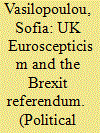

|
|
|
|
|
| Summary/Abstract |
This article shows that key to understanding the referendum outcome are factors such as a profoundly eurosceptic public, high levels of citizen uncertainty, divided mainstream political parties on the EU and lack of unity within the ‘Leave’ campaign. The Brexit referendum is more than just about domestic issues and government approval. Utilitarian concerns related to economic evaluations of EU integration coupled with support of or opposition to EU freedom of movement are very likely to influence vote choice. Those campaigns that focus on rational utilitarian arguments about the costs and benefits related to EU membership as a whole but also to EU freedom of movement are expected to swing voters.
|
|
|
|
|
|
|
|
|
|
|
|
|
|
|
|
| 15 |
ID:
145561
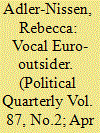

|
|
|
|
|
| Summary/Abstract |
The EU is divided between member states that have adopted the euro and those that have not. This article looks at the issue of differentiated integration with particular reference to eurozone integration and the euro-outsiders. I explore the recent public debate in the UK on euro-outsiderness, comparing this with debates in Denmark. The article highlights some striking differences between the UK and Denmark when it comes to the actual management of euro-outsiderness in Brussels as well as some of the dilemmas facing euro-outsiders such as the UK, Denmark, Sweden and Poland as the EU struggles to exit its crises. Finally, I discuss the future of two-speed European integration and the UK's possible exit from the EU. The UK cannot escape the dilemma of favouring either influence or autonomy; whether the UK remains in or leaves the EU, it will need to allow the eurozone to proceed in order to prevent further eurozone crises.
|
|
|
|
|
|
|
|
|
|
|
|
|
|
|
|
|
|
|
|
|